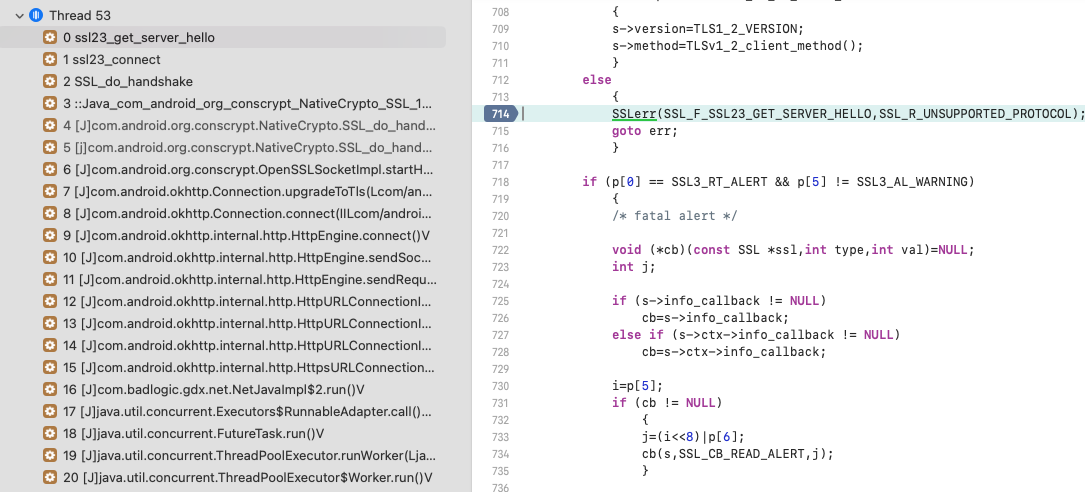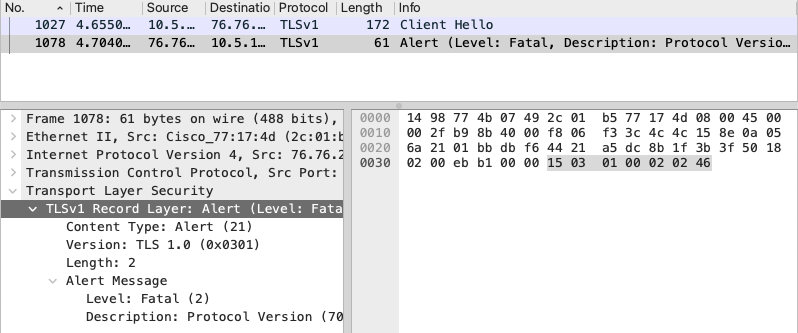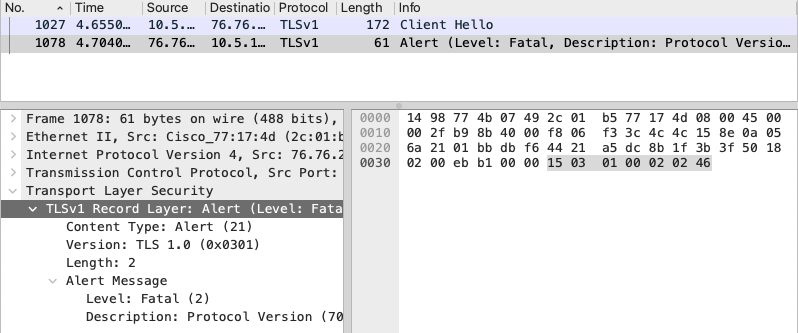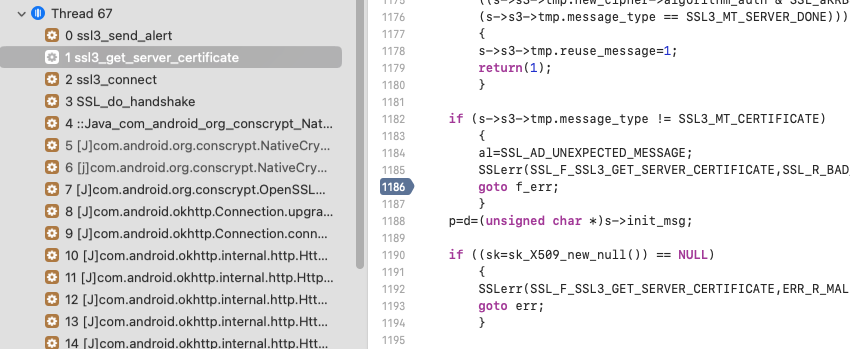Eldest bugs: Memory corruption during HTTPS operations
08 May 2024 | fix runtime okhttperror:14077102:SSL routines:SSL23_GET_SERVER_HELLO:unsupported protocol
This error appeared time to time in issues (#601 #585 #557 #306) and gitter.
Most of the time it was about crash reports without sample to reproduce.
And here Tom-Ski brings reproducible case…
Lets investigate.
Symptoms
First of all lets check the place where error is happening:

OpenSSL is not happy with Server Hello packet. Let’s look into p vector values:
[0] char '\x15' SSL3_RT_ALERT
[1] char '\x03' TLS1_VERSION_MAJOR
[2] char '\x01' TLS1_VERSION_MINOR
[3] char '\0'
[4] char '\x02'
[5] char '\x02'
[6] char 'F' TLS1_AD_PROTOCOL_VERSION
[7] char '\0'
Fatal TLS1_AD_PROTOCOL_VERSION tells us that requested protocol version TLS1 was rejected.
Here it goes in Wireshark:

While it is quite weird RoboVM requested TLS1 as its deprecated almost everywhere lets check wireshark for other errors. Here comes another interesting Alert:

This time Fatal alert comes from RoboVM side, means it is not happy with Server Hello. Break point on ssl3_send_alert shows where it happens:

And it happens as there was no Certificate in Server Hello but it is not expected, as its New Session Ticket response:
Server Hello, New Session Ticket, Change Cipher Spec, Encrypted Handshake Message
This means RoboVM code initiated handshake with rfc4507 session ticket to resume session but started looking for certificates in response.
Going up stack track while staying on breakpoint shows following:
case SSL3_ST_CR_CERT_A:
case SSL3_ST_CR_CERT_B:
#ifndef OPENSSL_NO_TLSEXT
ret=ssl3_check_finished(s);
if (ret <= 0) goto end;
if (ret == 2)
{
s->hit = 1;
if (s->tlsext_ticket_expected)
s->state=SSL3_ST_CR_SESSION_TICKET_A;
else
s->state=SSL3_ST_CR_FINISHED_A;
s->init_num=0;
break;
}
#endif
/* Check if it is anon DH/ECDH */
/* or PSK */
if (!(s->s3->tmp.new_cipher->algorithm_auth & SSL_aNULL) &&
!(s->s3->tmp.new_cipher->algorithm_mkey & SSL_kPSK))
{
ret=ssl3_get_server_certificate(s);
It means ssl3_check_finished fails, and it indeed had returned 1 and code for it following:
int ssl3_check_finished(SSL *s)
{
int ok;
long n;
/* If we have no ticket it cannot be a resumed session. */
if (!s->session->tlsext_tick)
return 1;
....
}
It seems like session ticked is missing. That is completely strange as at moment of sending Client Hello it was present and included into the packet.
It would take some time to investigate why session got corrupted by looking through all kind of synchronization but lucky for it crashed at exact place I was looking:

Releasing not valid pointer.
Root case
Long story short – there few places where session object and considering that its related to Session resume using session tickets this quick lead to Java side.
Shared session
Shared sessions are stored in HashMap in ClientSessionContext with host+port as a key. Java object for session contains native pointer to OpenSSL corresponding struct (sslSessionNativePointer).
Shared session is picked by OpenSSLSocketImpl during handshake:
OpenSSLSessionImpl sessionToReuse;
if (client) {
ClientSessionContext clientSessionContext = this.sslParameters.getClientSessionContext();
sessionContext = clientSessionContext;
sessionToReuse = this.getCachedClientSession(clientSessionContext);
if (sessionToReuse != null) {
NativeCrypto.SSL_set_session(this.sslNativePointer, sessionToReuse.sslSessionNativePointer);
}
}
It just sets it as pointer of cached session into SSL on native side (it is not copied and used as it is).
OpenSSLSessionImpl doesn’t perform any more action with sessionToReuse.
But when socket connection is closed, it deallocates own SSL native object:
private void free() {
if (this.sslNativePointer != 0L) {
NativeCrypto.SSL_free(this.sslNativePointer);
this.sslNativePointer = 0L;
this.guard.close();
}
}
And SSL_free destroys SHARED session:
void SSL_free(SSL *s)
{
....
/* Make the next call work :-) */
if (s->session != NULL)
{
ssl_clear_bad_session(s);
SSL_SESSION_free(s->session);
}
As result:
ClientSessionContextkeeps session object with pointer that was already de-allocated at native side;- next attempt to use
sessionToReusewill operate with de-allocated memory; - closing
OpenSSLSessionImplwith such session will de-allocated already invalid pointer.
the “fix”
Existing Conscrypt and OpenSSL code used in RoboVM is at Android4.4 level and pretty old.
Trying to fix it on existing source seems not easy/possible. Also, recent Android/Libcore handle these things completely different way.
There are moments present that are not taken in account: session might be marked as not_resumable and can’t be used in existing logic.
All this makes quite simple option – disable session caching.
It will affect https handshake as subsequent connections to same port/host will require full handshake with certificate exchange:
With session caching:

And without:

Code
Fix was proposed as PR785
PS: There is an options to go back to cached way by defining system property:
System.setProperty(“SSL_FAULTY_RFC4507_ON”, “”);


Comments